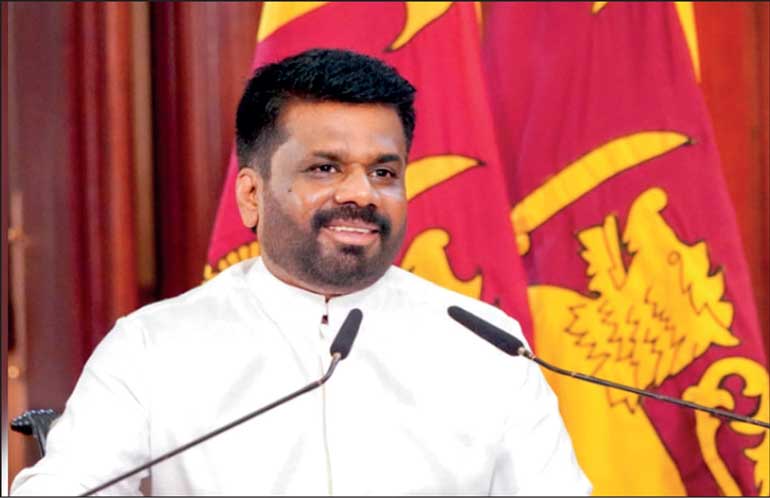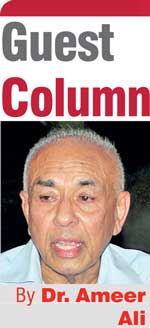Tuesday Feb 17, 2026
Tuesday Feb 17, 2026
Friday, 11 October 2024 00:22 - - {{hitsCtrl.values.hits}}

President Anura Kumara Dissanayake
 “Love locally and trade globally” (Russ Roberts)
“Love locally and trade globally” (Russ Roberts)
Renegotiating parts of IMF’s economic recovery program underlined the campaign platforms of AKD and his NPP teammates right from the beginning. While RW was bragging about his record of stabilising the economy and restarting growth, AKD was questioning the benefits of that growth to the citizenry. RW’s answer was that they may have to wait until 2048 to enjoy the splendour of his high-tech export miracle. In other words, their debate was about one of the fundamental controversies in economics of development between growth and equity.
IMF and its sister organisation World Bank were created after Second World War in 1944 to restart economic growth in a war dislocated Europe and in the underdeveloped economies within the capitalist zone respectively. The primary objective of these two institutions therefore was to promote economic growth and not delivering economic justice. The assumption was that economic equity would follow automatically once growth begins. What really did happen was the opposite. This is why even after eight decades of IMF and WB existence income disparity and wealth gap between the rich and poor nations and within each of them between the rich and poor has widened unprecedentedly. The growing global discontent against the ruling economic order tells the story.
In Sri Lanka, soon after the 2022 crash and consequent political fallout the stopgap president Ranil Wickremesinghe (RW) was smart enough to invite the IMF for the 17th time to take charge of repairing the bankrupt economy. With $ 2.9 billion loan under EFF to be delivered in nine tranches, IMF drew up a program for the recovery and started it with steps to stabilise the monetary sector. After two years and with CBSL’s capital controls monetary stability was indeed established and seeds of economic growth started sprouting. It is now expected that the economy would register a moderate growth rate of 2.2% in 2024 and may reach 4% in 2025.
Stability and growth achieved at disproportionate cost
However, that stability and growth were achieved at a disproportionate cost to ordinary Sri Lankans. As per advice from IMF the two annual budgets of 2022-23 and 2023-24 drawn by RW as Finance Minister were aimed primarily at achieving fiscal consolidation via raising Government revenue and reducing public expenditure so that the out-of-control budget deficits could be reined in. Measures taken to raise revenue such as broadening the tax base via VAT, raising tariffs on public utilities, and increasing import duties while reducing budget allocations to amenities of public welfare such as health and education were parts of IMF prescription to raise revenue and were duly implemented by RW. The Aswesuma safety net program to sweeten the bitterness barely eased the pain. In other words, equity was sacrificed to attain monetary stability and economic growth.
Public dissatisfaction naturally increased which was capitalised by all contestants to the presidency, but AKD went a step further and offered a radical solution by calling for change in the ruling political culture and governance. In a sense, RW’s record of economic stability and revival of growth were lost in the face of AKD’s campaign for greater economic equity and clean governance. His proposal to renegotiate with IMF on reducing the share of indirect taxes while not rejecting the entire program is pragmatic and reflects the perennial debate in economics between growth and equity.
More interested in growth than equity
As pointed out earlier, IMF is more interested in growth than equity. It is a class biased institution and believes that if a horse is fed with oats, something will drop from its hind for the sparrows to eat. Thus, once the wealthy and entrepreneurial classes are given the incentives to restart their investment and production activities by creating an environment of financial stability and market freedom, economic growth would pick up and prosperity would ensue. In Sri Lanka however, that environment and freedom was there at least since 1978. But the problem was bad governance. If the system of governance is nepotistic, corrupt and receptive to political lobbyism then there is no way any model for growth and or equity however perfect would deliver its optimum potential. It was this political culture and governance that made IMF to visit for the seventeenth time. Economy and governance are inseparable twins so much so that one cannot remain healthy when the other is sick.
The new regime has determined to put an end to this governance to improve performance of the economy. Certain initial steps it has taken so far to curb corruption and remove the corrupt from positions they held point towards the right direction. If a Rs. 100 tax for example brings only Rs. 50 revenue to the Government because of inefficiency in tax collection the solution is either to double the tax rate to get Rs. 100 revenue or improve the governance of tax administration. RW adopted the first option. IMF itself insisted on governance reforms when it reviewed the economy’s performance under the second tranche. With AKD undertaking those reforms there is a favourable environment for SL’s negotiators to convince IMF for reduction in the weightage on indirect taxes.
Foreign debt
 The other sensitive area to renegotiate is foreign debt. This is a hard nut to crack. Although the new regime is not responsible for this debt it cannot run away from settling it. In fact, one reason why IMF is keen in rebuilding the economy is to make it resourceful enough to honour its debt obligations to foreign creditors who are part of the global financial system and IMF is that system’s watch dog. But how much leverage does the new regime have to win more concessionary terms of settlement is difficult to contemplate. As it is, when the IMF program ends in 2027 the government would start paying 4.5% of GDP on debt servicing each year. That should come from almost one-third of government revenue from taxation which would then be converted through foreign exchange via export earnings. Unless the economy experiences robust rates of growth, SL would not be able to avoid further borrowing at high interest rates. The new regime’s economic challenge is therefore formidable.
The other sensitive area to renegotiate is foreign debt. This is a hard nut to crack. Although the new regime is not responsible for this debt it cannot run away from settling it. In fact, one reason why IMF is keen in rebuilding the economy is to make it resourceful enough to honour its debt obligations to foreign creditors who are part of the global financial system and IMF is that system’s watch dog. But how much leverage does the new regime have to win more concessionary terms of settlement is difficult to contemplate. As it is, when the IMF program ends in 2027 the government would start paying 4.5% of GDP on debt servicing each year. That should come from almost one-third of government revenue from taxation which would then be converted through foreign exchange via export earnings. Unless the economy experiences robust rates of growth, SL would not be able to avoid further borrowing at high interest rates. The new regime’s economic challenge is therefore formidable.
However, IMF cannot afford to leave SL at the tender mercies of foreign creditors because of the political and economic havoc debt burden would cause in an island which is strategically located in the Indian Ocean ad especially at a time when there is intense competition among regional and world powers to gain a foothold here. In this context, the proximity of SL to the Afanasy Nikin Seamount, just 1,050 km away from its shoreline, rich in cobalt, lithium and manganese which are critical minerals for clean energy is tempting attraction for underwater exploration to regional and Western industrial giants.
Although this seabed is away from SL’s international waters, yet it is closer than to either the Maldives or India. In 2009, SL applied to the UN Commission on the Limits of Continental Shelf for an extension of the oceanic boundary and a decision is pending. Can this be used as a bait to win more credit concessions from the rich is an issue worth exploring by SL’s diplomats and negotiators.
In sum, the economics behind IMF-AKD negotiations is a complex and difficult one. But it is in the interest of IMF shareholders not to be Shylocks demanding SL’s last pound of flesh by exploiting the current adversity. The new regime is committed to an open market economy with private enterprise and competition, and willing to welcome foreign investment to partner in the nation’s development endeavour. But it cannot afford to allow that market to be controlled by Mafiosi oligopolies with weak linkages to the local economy as noticeable in several developing economies.
The new regime is committed to develop an indigenous development path with foreign partnership. Such a model could in no way be the old defunct closed economy of 1970s. With such commitment negotiations between IMF and the new regime could be an ongoing consultative process with attainable goals. That regime therefore needs solid backing from the legislature and the forthcoming General Election should make it possible.
(The writer is attached to Business School, Murdoch University, W. Australia.)